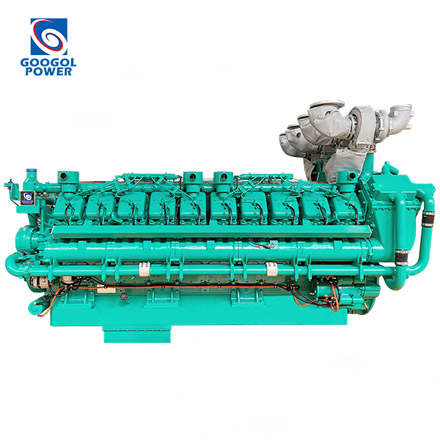- HOME
- ABOUT GOOGOL
- PRODUCTS
DIESEL ENGINE
GENERATOR SETS
- DOWNLOAD
- CASES
- NEWS
- CONTACT US
DIESEL ENGINE
GENERATOR SETS

The cylinder pulling of diesel engines is a common malfunction characterized by scraping marks and groovelike abrasions on the cylinder wall surface. Severe cases involve piston adhesion to the cylinder wall, piston seizing, and piston ring jamming. Cylinder pulling often results in a significant decrease in engine power, difficulty in starting, excessive gas and oil leakage, increased oil consumption, and can even cause piston seizure and engine shutdown.
1. MECHANISM OF DIESEL ENGINE CYLINDER PULLING
There are two types of diesel engine cylinder pulling: one is powder wear caused by mechanical impurities entering the cylinder, resulting in abrasions or substantial scratches on the cylinder wall surface parallel to the cylinder axis. The other type is fusion wear, a more destructive form, occurring when the oil film between the piston, piston ring, and cylinder wall fails to form or gets disrupted for some reason, causing localized dry friction and resulting in roughened surfaces, exacerbating wear and leading to cylinder pulling.
Cylinder pulling refers to severe surface damage caused by the relative movement between the cylinder and the piston or piston ring. It mostly occurs in new engines or after major repairs. After cylinder abrasion, lubricating oil enters the combustion chamber, leading to the emission of blue-black smoke in the exhaust pipe, causing substantial carbon buildup in the combustion chamber. Simultaneously, combustible gas may leak into the crankcase, diluting the lubricating oil. Severe instances exhibit 'gasping' through the oil filling port and may expel oil smoke. Additionally, there might be piston knocking noises and insufficient power output.
2. ANALYSIS OF DIESEL ENGINE CYLINDER PULLING CAUSES
2.1 AIR OBSTRUCTION IN THE COOLING SYSTEM OF LIQUIDCOOLED DIESEL ENGINES
After the installation of diesel engines in vehicles, the cooling system, with an additional water tank, is open to the atmosphere. However, in non-vehicular use or when undergoing hot testing on a test stand, before the thermostat opens, the cooling system remains mostly sealed. Under the forced circulation of the water pump in such a closed system, if air cannot be purged from the system, it can cause obstruction. This obstruction, under the influence of the water pump, moves within the system, causing inadequate or failed local cooling, resulting in engine overheating and leading to cylinder pulling.
2.2 OPERATIONAL REASONS:IMPROPER OPERATION CAN CAUSE CYLINDER PULLING,MAINLY IN THE FOLLOWING AREAS
(2.2.1) Inadequate oil supply during driving leads to insufficient lubrication at various friction points, cauing increased wear and faults such as cylinder pulling and bearing burning.
(2.2.2) Running the diesel engine under low oil pressure affects the normal oil circulation and pressure lubrication, leading to insufficient oil supply to friction surfaces, resulting in wear, cylinder pulling, or bearing faults.
(2.2.3) Operating the engine consistently at high speeds or heavy loads causes the engine to operate under excessive load conditions for an extended period, resulting in rough combustion, engine overheating, increased thermal and mechanical loads on cylinder liners, pistons, leading to damage and faults like cylinder and piston seizure.
(2.2.4) Running at no load or highspeed/high-oad conditions during the runningin period can cause cylinder pulling due to diluted cylinder wall oil caused by fuel dilution and, if operated abruptly, can lead to cylinder pulling. During prolonged high-speed or load runningin, the oil film is easily damaged, and localized metal contact areas are not promptly cooled, causing cylinder pulling.
(2.2.5) Immediate highload operation without preheating the engine: At cold startup, when the oil temperature is low and viscosity is high, insufficient oil flow to lubricate the cylinder liner and piston components can occur. Insufficient oil pump supply and the oil on the original cylinder wall flowing along the wall after parking lead to rapid wear and cylinder pulling at startup.
(2.2.6) Insufficient coolant during operation causes overheating, leading to increased thermal loads on main heat-affected parts like cylinder liners and pistons, reducing mechanical performance, increasing deforma-tion, disrupting technical coordination, exacerbating wear, and causing piston jamming in the cylinder. Additionally, engine overheating causes a decrease in oil viscosity, worsening lubrication conditions and resulting in abnormal wear, cylinder pulling, bearing burning, and crankshaft seizure.
3. MAINTENANCE AND MAINTENANCE-RELATED REASONS
This is often due to failure to follow maintenance guidelines, including:
(3.1) Failure to clean the oil filter in time can cause excessive resistance or blockage, bypassing the oil filter core, leading to severe wear and abrasions on the cylinder wall and piston components using unfiltered oil for lubrication.
(3.2) Failure to check and adjust the fuel supply advance angle in time can cause excessive advance angle, resulting in rough engine operation, increased thermal and mechanical loads, leading to cylinder seizure and faults.
(3.3) Poor maintenance of the air filter allows dust and sediment in the air to enter the cylinder, acting as harmful abrasives, adhering to the cylinder wall surface, causing severe wear and damage to the cylinder and piston components.
(3.4) Delayed or inadequate oil addition or replacement leads to dirty oil, affecting lubrication and caus-ing increased wear and faults. Dirty oil, if not replaced promptly, accelerates component wear and may cause lubrication deterioration or block oil pipes and channels, resulting in faults like cylinder pulling and bearing burning.
(3.5) Use of nonstandard or inappropriategrade oil leads to insufficient oil film formation on friction surfaces, poor lubrication, and can cause faults like cylinder pulling and bearing burning. Using oil with low viscosity makes oil film formation difficult at higher temperatures, while using oil with high viscosity impedes flow and reliable lubrication to various friction surfaces, resulting in faults like cylinder pulling and bearing burning.